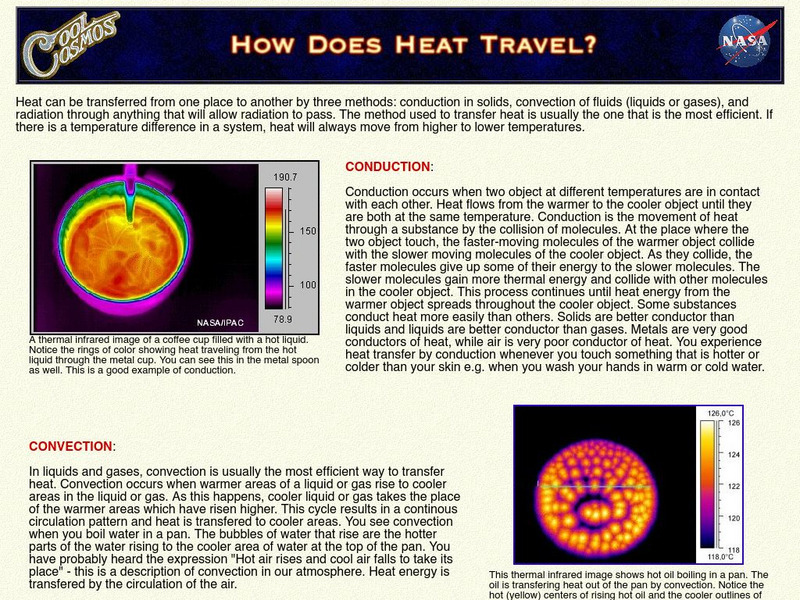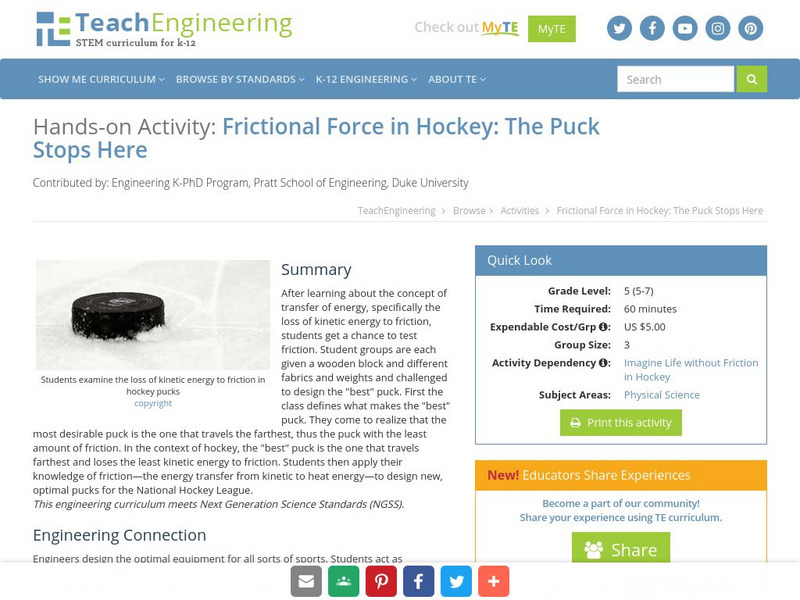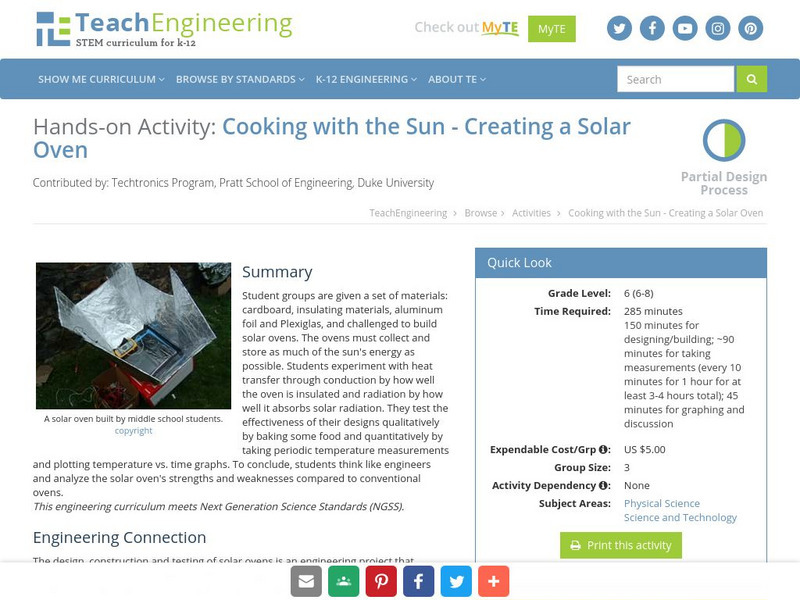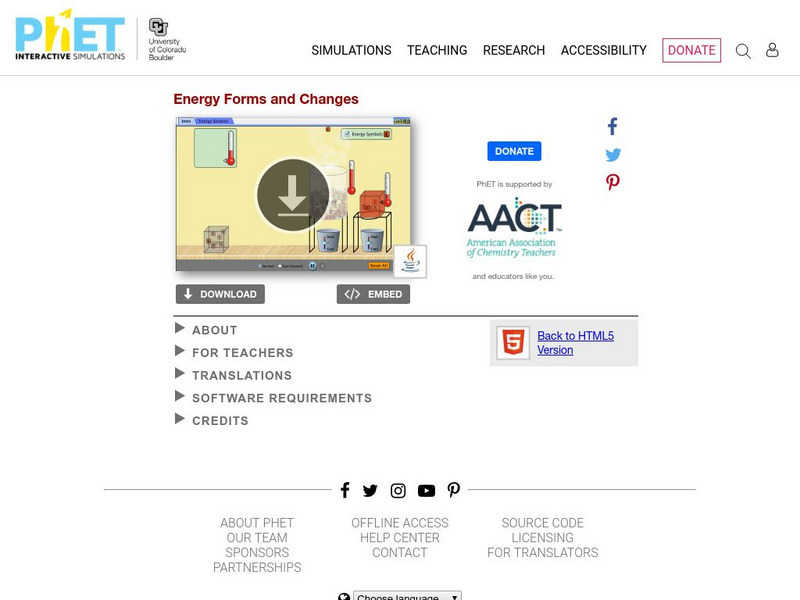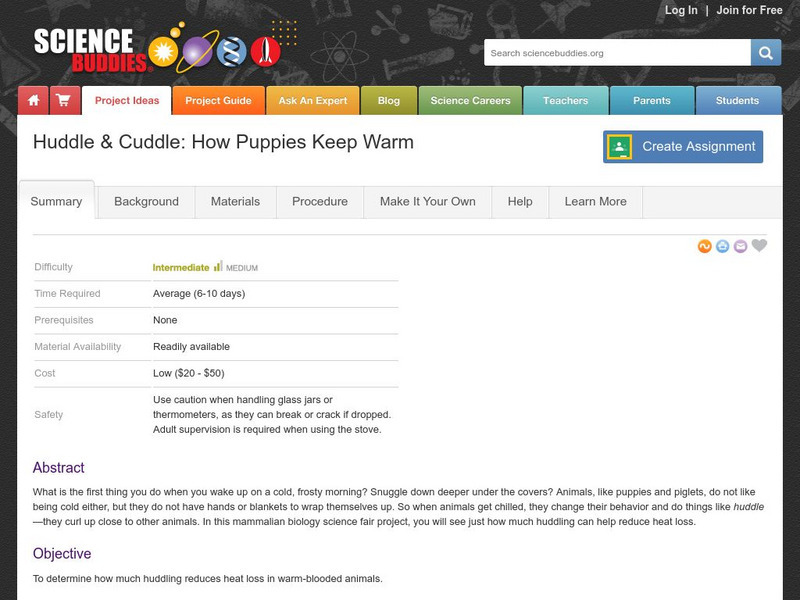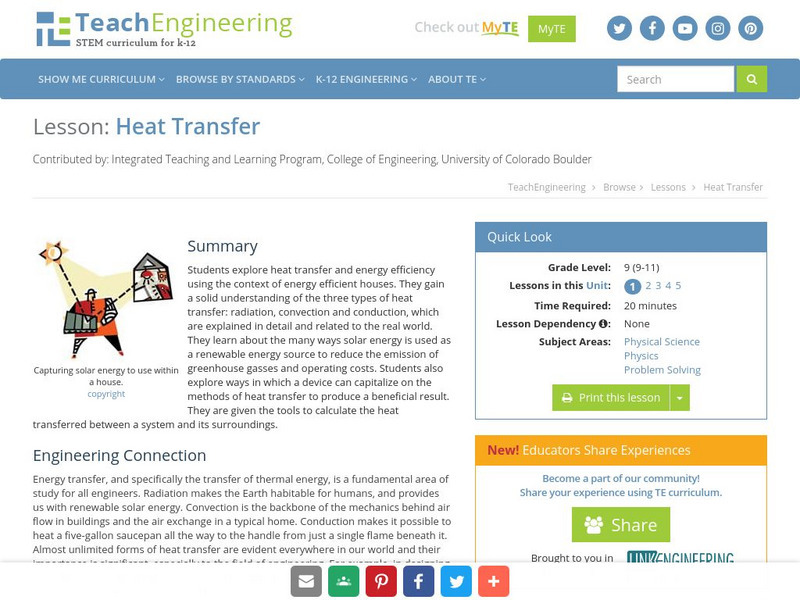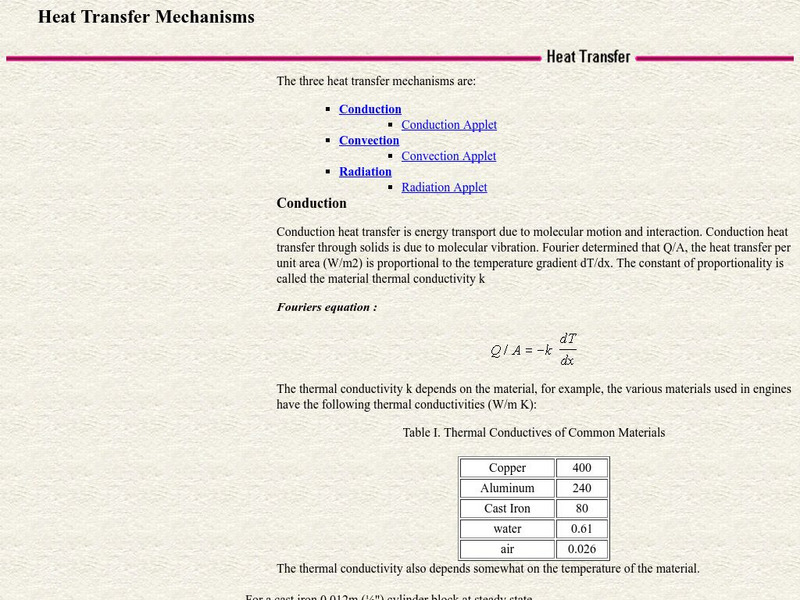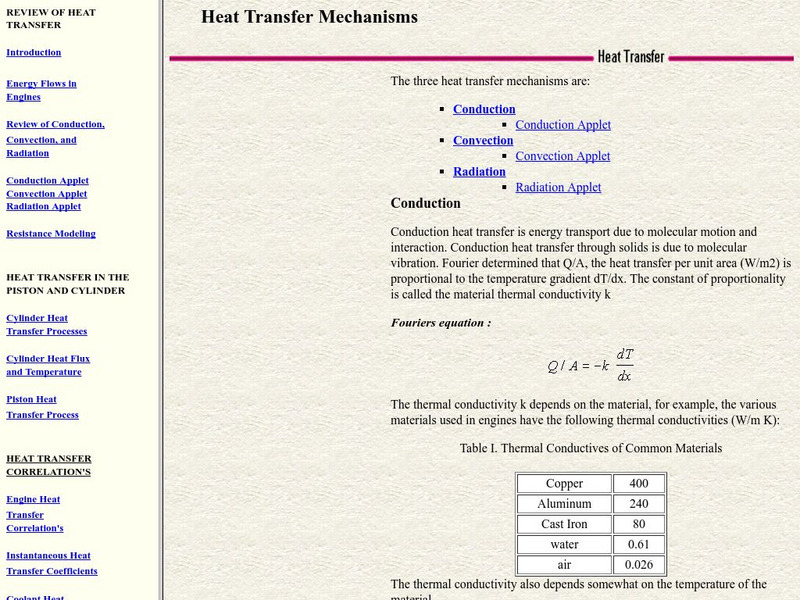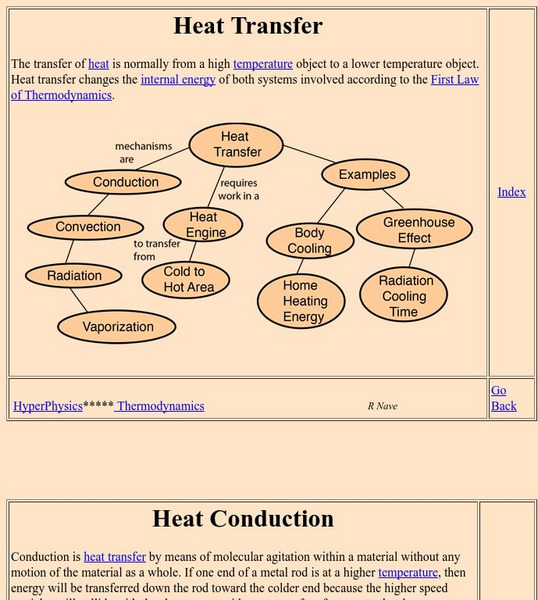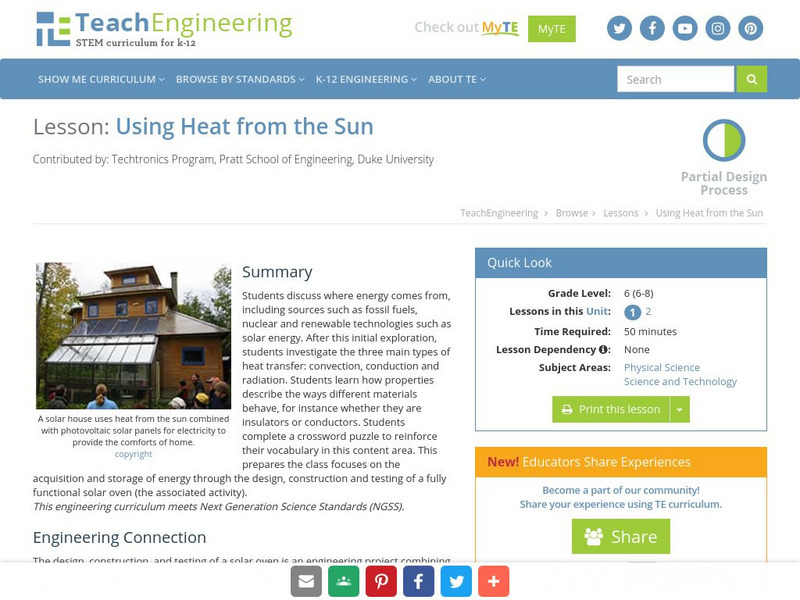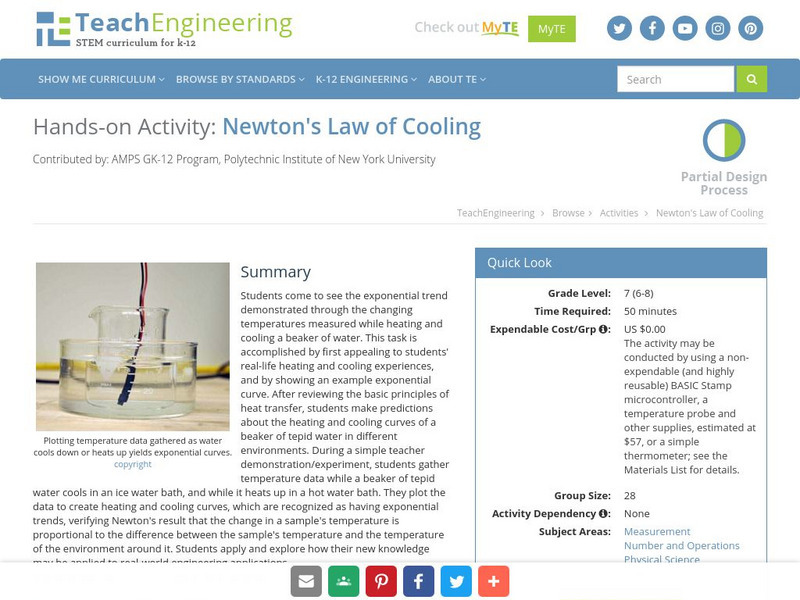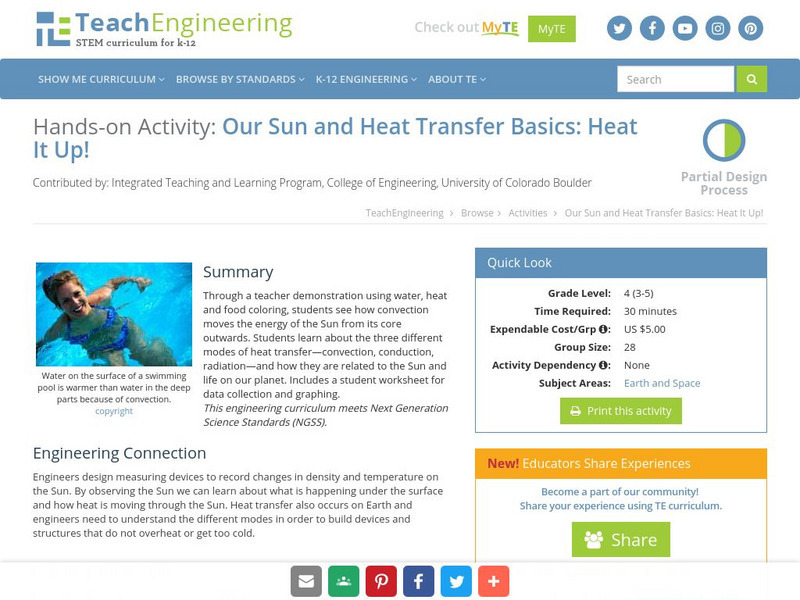Hi, what do you want to do?
E-learning for Kids
E Learning for Kids: Science: Titanic Shipwreck: How Does Heat Travel?
David is exploring the Titanic shipwreck. He needs to stay warm down below in the water. Help him learn about heat and temperature.
CK-12 Foundation
Ck 12: Heat Transfer
Students explore the relationship between heat and energy transfer, and then describe how energy is transported through the processes of conduction, convection, and radiation. [Free Registration/Login may be required to access all...
California Institute of Technology
Nasa: Cool Cosmos: How Does Heat Travel?
An explanation, with infrared images, of how heat is transferred from one object to another.
Physics Classroom
The Physics Classroom: Thermal Physics: What Does Heat Do?
This physics tutorial covers the topic of measuring the quantity of heat that is transferred between the system and the surroundings. Students learn about calorimetry- the science associated with determining the changes in energy of a...
CK-12 Foundation
Ck 12: Physical Science: Heat
[Free Registration/Login may be required to access all resource tools.] Definition of heat and how thermal energy is transferred.
TOPS Learning Systems
Tops Learning Systems: Top Science: Conduction and Convection [Pdf]
Experiment investigating conduction and convection of heat in water.
OpenSciEd
Open Sci Ed: 6.2 Thermal Energy
This Thermal Energy unit has students investigating two ways to transfer energy into a drink: (1) the absorption of light and (2) thermal energy from the warmer air around the drink. They are then challenged to design their own drink...
TeachEngineering
Teach Engineering: The Puck Stops Here
After learning about transfer of energy, specifically the loss of kinetic energy to friction, students get a chance to test friction. In groups they are given a wooden block, different fabrics, and weights and asked to design the "best"...
TeachEngineering
Teach Engineering: Cooking With the Sun Creating a Solar Oven
For this activity, students will be given a set of materials: cardboard, a set of insulating materials (i.e. foam, newspaper, etc.), aluminum foil, and Plexiglas. Students will then become engineers in building a solar oven from the...
University of Colorado
University of Colorado: Ph Et Interactive Simulations: Energy Forms and Changes
Explore how heating and cooling iron, brick, and water adds or removes energy. See how energy is transferred between objects. Build your own system, with energy sources, changers, and users. Track and visualize how energy flows and...
Science Buddies
Science Buddies: Project Ideas: Huddle and Cuddle: How Puppies Keep Warm
In this mammalian biology science fair project, students will determine how much huddling reduces heat loss in warm-blooded animals. The Science Buddies project ideas are set up consistently beginning with an abstract, objective, and...
Alabama Learning Exchange
Alex: Which Came First, Ice Cream or Refrigeration?
As students begin their study of states of matter, this hands-on activity demonstrates how the interaction of a solid and a liquid can reverse the initial state of each material.This lesson plan was created as a result of the Girls...
TeachEngineering
Teach Engineering: Heat Transfer
Learners explore heat transfer and energy efficiency using the context of energy efficient houses. They gain a solid understanding of the three types of heat transfer: radiation, convection and conduction, which are explained in detail...
Colorado State University
Csu: Heat Transfer Mechanisms
An excellent page from the Colorado State University with a heavy mathematical emphasis. Each form of heat transfer--conduction, convection, and radiation--is defined, compared, and contrasted. Mathematical equations governing the rates...
Colorado State University
Colorado State University: Heat Transfer Mechanisms
An excellent page from the Colorado State University with a heavy mathematical emphasis. Each form of heat transfer--conduction, convection, and radiation--is defined, compared and contrasted. Mathematical equations governing the rates...
Georgia State University
Georgia State University: Hyper Physics: Heat Convection
Using understandable words and exceptional graphics, this page describes the transfer of energy by means of the convection process. Contains several links to related topics.
State University of New York
State University of New York: Heat Transfer Between Substances
The following simulation assesses students understanding of thermal energy, transfer and equilibrium.
Physics Aviary
Physics Aviary: Practice Problems: Heat Transfer Problem
Determine the rate at which heat moves through a barrier that is separating gases at two different temperatures.
TeachEngineering
Teach Engineering: Using Heat From the Sun
In this lesson, students will first discuss where energy comes from, including sources such as fossil fuels, nuclear, and such renewable technologies as solar. After this initial exploration, students will investigate the three main...
TeachEngineering
Teach Engineering: Newton's Law of Cooling
Students come to see the exponential trend demonstrated through the changing temperatures measured while heating and cooling a beaker of water. This task is accomplished by first appealing to students' real-life heating and cooling...
TeachEngineering
Teach Engineering: Heat It Up!
Through a teacher demonstration using water, heat and food coloring, students see how convection moves the energy of the Sun from its core outwards. Students learn about the three different modes of heat transfer (convection, conduction,...
Texas Education Agency
Texas Gateway: The First Law of Thermodynamics
By the end of this section, you will be able to define the first law of thermodynamics; describe how conservation of energy relates to the first law of thermodynamics; identify instances of the first law of thermodynamics working in...
Utah Education Network
Uen: Energy Transfers
Students will model and measure energy transfers from light to heat.
National Institute of Standards and Technology (NIST)
Thermophysical Properties of Fluid Systems
At this site, the student can find out thermophysical properties of different fluids and gases.







